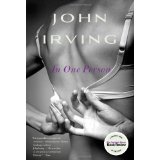
The novel begins with the protagonist, Billy, meeting Miss Frost, the librarian for the first time. The “statuesque” Miss Frost (as Billy’s Aunt Muriel refers to her) captives Billy, who is at the delicate age of 13 and easily awestruck, but by 15, Billy was totally smitten with her.
He tells Miss Frost he wants to be a writer after reading Dickens, “Great Expectations.” Billy often confides in Miss Frost, and heeds her advice about most things, as their relationship evolves. Miss Frost would tell Billy at a pivotal point in their relationship, ” My dear boy, please don’t put a label on me-don’t make me a category before you get to know me!”
Acceptance, honesty, humility and living a true life are central to this beautifully written novel. Set in Vermont in the 1960’s, it will follow Billy’s life as a bisexual man through the age of 68. It is a gentle rendition of Billy’s life events as he remembers them. It could not have been easy being bisexual in the last fifty years, but there is no horror, no over the top melodrama that Billy endured. There were unpleasant and hurtful trials in his life, but Billy’s memories are not soaked with anger, frustration and bitterness.
A bisexual isn’t trusted by either heterosexuals or homosexuals. But you don’t see Billy agonizing over being bisexual. Billy appears well-adjusted and accepting of his sexuality and possibly because of this acceptance doesn’t go through the angst or torment that some of the other characters seem to, no matter what their sexual preference. Tom Atkins, Billy’s friend, paid a huge price for not being honest during the AIDS epidemic in the 1980’s.
Grandfather Harry, my favorite character, was certainly honest as a cross-dressing lumberjack, he always played the women’s parts in the local theatre beating out his own daughter for some of the roles. Grandpa Harry showed Billy that difference didn’t mean a bad thing. He was very close with Billy, unlike his own mother, Mary, who just wants him to be normal.
There is a tenderness to this novel. It doesn’t provoke anything except acceptance and getting to know each other without labeling.
It’s a great book for book clubs discussions involving sexual preferences, parents help or hindrance in their children’s sexuality, society’s acceptance, individual acceptance, honesty – the ability to live our true lives.
Rating: 8.0